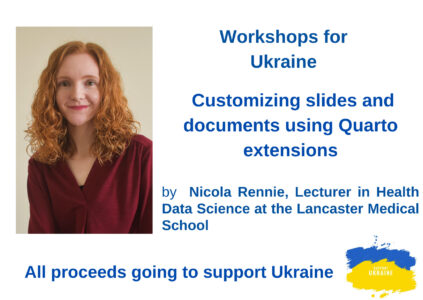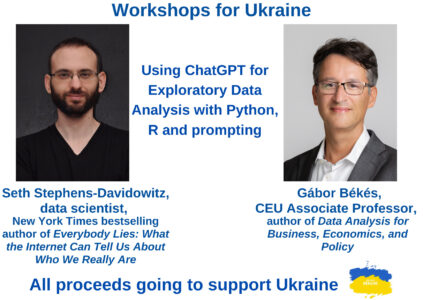Join our workshop on Conducting Simulation Studies in R, which is a part of our workshops for Ukraine series!
Here’s some more info:
Title: Conducting Simulation Studies in R
Date: Thursday, May 23rd, 18:00 – 20:00 CEST (Rome, Berlin, Paris timezone)
Speaker: Greg Faletto is a statistician and data scientist at VideoAmp, where he works on causal inference. Greg completed his Ph.D. in statistics at the University of Southern California in 2023. His research focused on developing machine learning methods has been published in venues like the International Conference on Machine Learning and the Proceedings of the National Academy of Sciences. Greg has taught classes at USC on data science and communicating insights from data, and he has previously presented his research and led workshops at venues including USC, the University of California San Francisco, the University of Copenhagen, Data Con LA, and IM Data Conference.
Description: In simulation studies (also known as Monte Carlo simulations or synthetic data experiments), we generate data sets according to a prespecified model, perform some calculations on each data set, and analyze the results. Simulation studies are useful for testing whether a methodology will work in a given setting, assessing whether a model “works” and diagnosing problems, evaluating theoretical claims, and more. In this workshop, I’ll walk through how you can use the R simulator package to conduct simple, reproducible simulation studies. You’ll learn how to carry out the full process, including making plots or tables of your results.
Minimal registration fee: 20 euro (or 20 USD or 800 UAH)
How can I register?
- Go to https://bit.ly/3wvwMA6 or https://bit.ly/4aD5LMC or https://bit.ly/3PFxtNA and donate at least 20 euro. Feel free to donate more if you can, all proceeds go directly to support Ukraine.
- Save your donation receipt (after the donation is processed, there is an option to enter your email address on the website to which the donation receipt is sent)
- Fill in the registration form, attaching a screenshot of a donation receipt (please attach the screenshot of the donation receipt that was emailed to you rather than the page you see after donation).
If you are not personally interested in attending, you can also contribute by sponsoring a participation of a student, who will then be able to participate for free. If you choose to sponsor a student, all proceeds will also go directly to organisations working in Ukraine. You can either sponsor a particular student or you can leave it up to us so that we can allocate the sponsored place to students who have signed up for the waiting list.
How can I sponsor a student?
- Go to https://bit.ly/3wvwMA6 or https://bit.ly/4aD5LMC or https://bit.ly/3PFxtNA and donate at least 20 euro (or 17 GBP or 20 USD or 800 UAH). Feel free to donate more if you can, all proceeds go to support Ukraine!
- Save your donation receipt (after the donation is processed, there is an option to enter your email address on the website to which the donation receipt is sent)
- Fill in the sponsorship form, attaching the screenshot of the donation receipt (please attach the screenshot of the donation receipt that was emailed to you rather than the page you see after the donation). You can indicate whether you want to sponsor a particular student or we can allocate this spot ourselves to the students from the waiting list. You can also indicate whether you prefer us to prioritize students from developing countries when assigning place(s) that you sponsored.
If you are a university student and cannot afford the registration fee, you can also sign up for the waiting list here. (Note that you are not guaranteed to participate by signing up for the waiting list).
You can also find more information about this workshop series, a schedule of our future workshops as well as a list of our past workshops which you can get the recordings & materials here.
Looking forward to seeing you during the workshop!

